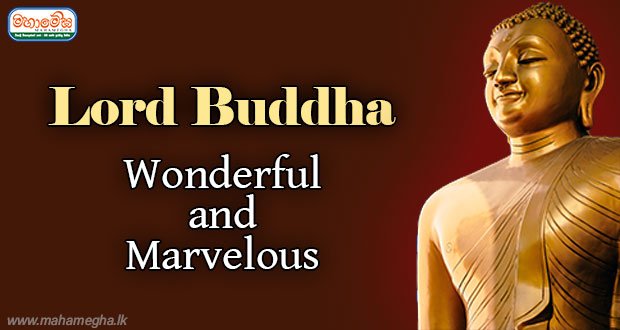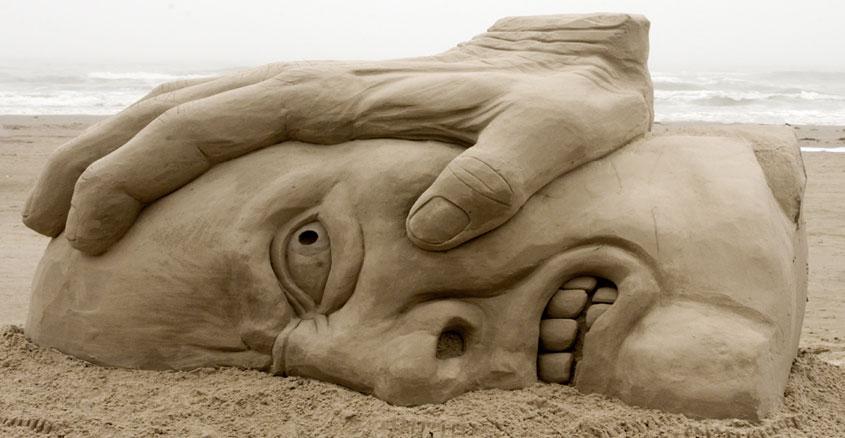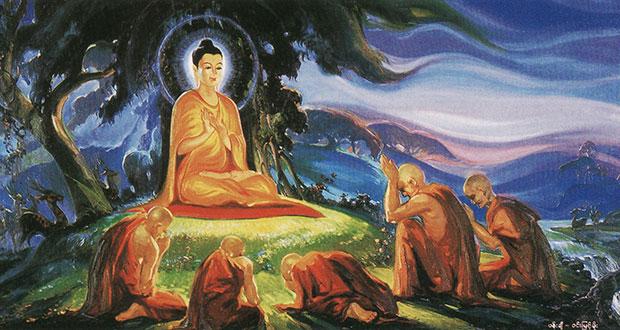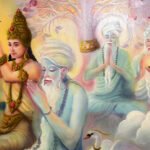From time to time we hear about people who perform extraordinary feats, people who possess exceptional skills, and people who go to remarkable lengths to help or save animals, forests, or fellow humans. Their lives’ work invokes great admiration toward them and even inspires others to follow in their footsteps. Yet, such admiration and inspiration are often short lived, and those inspired by the example of great heroes often experience undesirable outcomes in trying to emulate them. We may marvel at their extraordinary performances, actions or talent, yet over time they gradually fade away from our minds, failing to leave a lasting impression. More often than not, we watch or read about these extraordinary stories for entertainment. Hence they do not add value or change our lives for the better.
However, when a Buddha appears in this world and explains the Noble Dhamma that abolishes all defilements of the human mind, out of great compassion for the multitude, this extremely rare and extraordinary happening not only confer meaning on our lives but also opens up the Path to liberation from suffering. The wonderful and marvelous, acchariya-abbhūta, events that occurred with the arising of the Lord Gautama Buddha are immeasurable, as are the wonderful and marvelous qualities of our Great Teacher. On this Vesak full-moon day, we have the opportunity to reflect on Him—our guiding lamp in this life, our supreme kalyāṇamitta, the Enlightened Teacher who for 45 years taught the Dhamma He discovered to the world, who attained the highest bliss of Nibbāna and guided lay disciples and monastics for the purpose of freeing themselves from all bonds and gaining true, lasting happiness. Let us recollect a handful of the wonderful and marvelous qualities of our supreme teacher, the Lord Buddha.
The arising of a Buddha is an extremely rare event in the world. Every Buddha in His last birth, as a Bodhisatta, is born either into a royal family or into a brahmin family, both castes being the upper-echelon in the Indian social structure. The Lord Gautama Buddha was born as heir to the throne in a royal family in the Sākya Republic. Before he was born into the human world, the Bodhisatta was born in the Tusita heaven mindful and fully aware. This is a wonderful and marvelous, acchariya-abbhūta, quality of the Lord Buddha. The Bodhisatta remained in the Tusita heaven mindful and fully aware, and the Bodhisatta lived the full life span of a deva in the Tusita heaven. Mindful and fully aware, the Bodhisatta passed away from the Tusita heaven and descended into his mother’s womb. To understand the extraordinary nature of these qualities, we must question ourselves: Do we know where we existed in our immediately preceding life? Did we come to our mother’s womb mindfully and aware of our surroundings? Did we at least know that there is such a thing as past lives, if not for the Teachings of the Buddha? Therefore, let us try to nourish our faith in our supreme teacher by learning and contemplating on His wonderful and marvelous qualities.
When the Bodhisatta descended into his mother, Queen Mahamaya’s womb, mindful and fully aware, a great, immeasurable light surpassing the splendor of the gods appeared in the world. And this light even reached those abysmal worlds that are shrouded in utter darkness, where the sun and the moon, mighty and powerful as they are, cannot make their light reach. It was only then that the beings in those hell worlds perceived that there are other beings there and remarked: “Indeed there are other beings born here.” And at that moment the ten-thousand-fold world system shook and quaked and trembled. This is a wonderful and marvelous quality of the Lord Buddha.
This great and immeasurable light which surpasses the splendor of the gods, reaching even abysmal hell worlds, which are otherwise in utter darkness, where the light of the mighty sun and the moon do not prevail, appears in the world only on four occasions. The Buddha explained these four occasions as wonderful and marvelous events, acchariya-abbhūta dhamma, that occur when a Buddha appears in the world. Those four occasions are as follows:
• When the Bodhisatta descends from the Tusita heaven into his mother’s womb.
• When the Bodhisatta, mindful and fully aware, is born into this world.
• When the Bodhisatta realizes the Four Noble Truths and become a Fully Enlightened Sammā-Sambuddha.
• When the Buddha expounds the Dhamma for the first time.
AN – IV Astounding (1) [Tathāgata Acchariya Sutta]
The mother who carries the Bodhisatta in her womb becomes an exceptional mother because of her baby. When the Bodhisatta descended from Tusita heaven into his mother’s womb, the Four Great King Devas from four quarters came to guard him so that no human or non-human could do any harm to the Bodhisatta or his mother. This is a wonderful and marvelous quality of the Lord Buddha. The moment the Bodhisatta descended into Queen Mahāmāya’s womb, she became instinctively virtuous: refraining from killing living beings, from taking what is not given, from sexual misconduct, from false speech, and from wines, liquors, and intoxicants; sensual thoughts did not arise in her concerning men, and she was inaccessible to any man with a lustful mind. The Bodhisatta‘s mother Queen Mahāmāya lived a luxurious life furnished with the five objects of sensual pleasure. She was free from all kinds of affliction. She lived blissfully without bodily fatigue. This is a wonderful and marvelous quality of the Lord Buddha.
Besides all this, the most marvelous, most extraordinary experience Queen Mahāmāya had was that she saw the Bodhisatta, with all his faculties intact, in her womb as clearly as a man with good sight can see a blue, yellow, red, white, or a brown thread inside a well-cut, eight faceted, fine beryl gem. Unlike other mothers who carry their babies for either nine or ten months, the Bodhisatta’s mother carried him in her womb for exactly ten months. These are wonderful and marvelous qualities of the Lord Buddha.
The birth of the Bodhisatta as Prince Siddhartha is well-known to all Buddhists. However, most of us are unaware of the multifarious events that occurred on that fateful day. We are ignorant about the fact that all of these wonderful and marvelous events happened because of the immeasurable virtues of the Lord Buddha. While most women give birth seated or lying down, the Bodhisatta’s mother gave birth to him while standing up. When the Bodhisatta came out from her womb unsullied and untarnished by liquid, phlegm, blood or any other impurities, first devas received him, then humans. The Four Great King Devas who had been protecting him received him before the Bodhisatta touched the ground and set him before Queen Mahāmāya.
Further, when the Bodhisatta came forth from his mother’s womb, two jets of water appeared from the ground, one cool and one warm, for bathing the Bodhisatta and his mother. These water springs remained for 1000 years after the birth of Prince Siddhartha, our Bodhisatta, and were also documented as still extant by the Chinese Buddhist monk and pilgrim Xuanzang (Hiuen Tsang) during his travels to India in the 7th century. As soon as he was born, the Bodhisatta stood firmly on the ground and took seven steps toward the north. He surveyed the four quarters and uttered these unforgettable words; “I am the foremost in the world; I am superior in the world; I am the senior in the world. This is my last birth, there is no more rebirth for me.” This too is a wonderful and marvelous quality of the Lord Buddha. Further, seven days after the birth of the Bodhisatta, his mother died and was born in the Tusita heaven. This is a wonderful and marvelous, acchariya-abbhūta, quality of the Lord Buddha.
Another wonderful and marvelous quality of the Buddha is the impeccable mindfulness and awareness He possessed. The Buddha said: “For the Tathāgata, feelings are known as they arise, as they are present and as they disappear. Perceptions are known as they arise, as they are present, and as they disappear. Thoughts are known as they arise, as they are present, and as they disappear.”
MN 123 – Wonderful and Marvelous (Acchariya-abbhūta Sutta)
Furthermore, when a Buddha appears in this world and explains the Noble Dhamma that abolishes desire, to humans and devas who indulge in desire, who find happiness in desire, they listen carefully; they develop a liking to end desire, and they strive to realize the Noble Dhamma.
When a Buddha appears in this world and explains the Noble Dhamma that abolishes egoism, to humans and devas who rejoice in egoism, who find happiness in egoism, they listen carefully with eager ears. They develop a desire to end egoism and strive to realize the Noble Dhamma.
When a Buddha appears in this world and explains the Noble Dhamma that quells excitement, to humans and devas who rejoice in excitement, who find happiness in excitement, they listen carefully with eager ears. They develop a desire to mollify excitement and strive to realize the Noble Dhamma.
When a Buddha appears in this world and explains the Noble Dhamma that dispels delusion and ignorance, to humans and devas who rejoice in delusion and ignorance, who find happiness in delusion and ignorance, they listen carefully with eager ears. They develop a desire to rid themselves of delusion and ignorance and strive to realize the Noble Dhamma.
These are wonderful and marvelous occurrences that happen only when a Buddha is born in this world.
AN – IV Astounding (2) [Dutiya Tathāgata Acchariya Sutta]
If anyone finds it difficult to believe these acchariya-abbhūta qualities of our Lord Gautama Buddha, let us ponder for a brief moment who exactly a Buddha is. Is He an ordinary person who founded a religion? No. He did not formulate a mere belief system; he found a way to ultimate freedom—freedom from the notion of ‘me,’ ‘mine,’ and ‘myself.’ Once a certain Brahmin named Doṇa, noticing the thousand-spoked wheels of the footprints of the Buddha, approached Him and asked whether He was a deva, a gandhabba, a yakkha, or a human being. To this, the Buddha replied that He had destroyed all taints that condition rebirth as a deva, gandhabba, yakkha, or a human being, avowing, “Remember me, brahmin, as a Buddha.”
This great reveal helps us understand the nature of a Buddha. He was one who freed Himself from all worlds, from all suffering. He belongs to the sphere of the ‘muni,’ a sage of sages that has eradicated greed, hatred, and delusion. We call the Buddha ‘Mahāmuni’ (Supreme Sage), ‘Munirāja’ (King of Sages), ‘Munissaro’ (Lord of Sages).
We should as a habit contemplate upon the boundless qualities of the Buddha so that our faith and confidence in the Buddha continues to grow and forever rejoice thinking how fortunate we are to hear His Teachings and to go for refuge as disciples. The birth of Gautama Buddha on this Vesak full-moon day, 2643 years ago, was a wonderful and marvelous occurrence; His Unsurpassed Perfect Enlightenment was a wonderful and marvelous occurrence, His whole life was a wonderful and marvelous occurrence. The Buddha Himself was a wonderful and marvelous, acchariya-abbhūta individual.
My homage be to thee—Oh Gautama, the Perfectly Self-Enlightened Buddha!
Written by
Prajapathi Jayawardena












Recent Comments